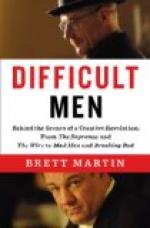Hardy ambled into the room, and looked around in the most casual way. His eye lit upon Uncle Henry first of all, naturally; for he had all but bumped into him.
“How are you, Smith?” he said. “Evenin’.”
And Angela piped up, to both uncle and nephew: “Good evening.”
Gilbert bowed. “How do you do? Won’t you sit down?” And he pulled out a chair for Angela.
“No, thanks,” Hardy said; but
“Yes, thanks!” his daughter decided, and popped into a seat. “Red” loved her for it.
Hardy turned to young Jones. “Well?” was all he said. He referred to his state of health—not that he cared how Gilbert felt.
“Anything but,” the latter answered.
Jasper Hardy always went right to the point. He disliked equivocation; so he rasped out immediately:
“Have you got the money?”
“No.”
Angela, who was tender-hearted, tried to intercede.
“Now, father!” she pleaded. She hated this business.
But Hardy paid not the slightest heed to her. He was a man of action, and women shouldn’t interfere—particularly young and pretty girls.
“Then I reckon I’ll have to foreclose,” he went on relentlessly. “There’s nothing else to do.” His hands closed tightly, and his hard eyes looked even harder.
“I’m afraid you’re right,” Gilbert said. “I was afraid it would be inevitable. I couldn’t have hoped for anything else.”
“I’m sorry,” Jasper Hardy announced; but did not mean it.
Gilbert told him so. “Moreover, I know how you got your money,” the young man was not afraid to say.
“I know how he got mine, gol darn it!” Uncle Henry cried. Hardy glared at him, seemed to smite him with his eyes.
“I’m not in business for my health,” he said coldly.
“Nor for anybody else’s,” Uncle Henry, unabashed, told him.
Angela feared there was going to be trouble. “Now, daddy, you mustn’t—you really mustn’t—I feel—”
But her father did not hear her.
“The time’s up at eight o’clock,” was all he said, and looked sternly at Gilbert, much as a judge who is pronouncing sentence looks at the prisoner at the bar.
“I know it,” said Gilbert.




